window._wpemojiSettings = {"baseUrl":"https:\/\/s.w.org\/images\/core\/emoji\/15.0.3\/72x72\/","ext":".png","svgUrl":"https:\/\/s.w.org\/images\/core\/emoji\/15.0.3\/svg\/","svgExt":".svg","source":{"concatemoji":"https:\/\/www.isev.co.uk\/wp\/wp-includes\/js\/wp-emoji-release.min.js?ver=6.7.1"}};
/*! This file is auto-generated */
!function(i,n){var o,s,e;function c(e){try{var t={supportTests:e,timestamp:(new Date).valueOf()};sessionStorage.setItem(o,JSON.stringify(t))}catch(e){}}function p(e,t,n){e.clearRect(0,0,e.canvas.width,e.canvas.height),e.fillText(t,0,0);var t=new Uint32Array(e.getImageData(0,0,e.canvas.width,e.canvas.height).data),r=(e.clearRect(0,0,e.canvas.width,e.canvas.height),e.fillText(n,0,0),new Uint32Array(e.getImageData(0,0,e.canvas.width,e.canvas.height).data));return t.every(function(e,t){return e===r[t]})}function u(e,t,n){switch(t){case"flag":return n(e,"\ud83c\udff3\ufe0f\u200d\u26a7\ufe0f","\ud83c\udff3\ufe0f\u200b\u26a7\ufe0f")?!1:!n(e,"\ud83c\uddfa\ud83c\uddf3","\ud83c\uddfa\u200b\ud83c\uddf3")&&!n(e,"\ud83c\udff4\udb40\udc67\udb40\udc62\udb40\udc65\udb40\udc6e\udb40\udc67\udb40\udc7f","\ud83c\udff4\u200b\udb40\udc67\u200b\udb40\udc62\u200b\udb40\udc65\u200b\udb40\udc6e\u200b\udb40\udc67\u200b\udb40\udc7f");case"emoji":return!n(e,"\ud83d\udc26\u200d\u2b1b","\ud83d\udc26\u200b\u2b1b")}return!1}function f(e,t,n){var r="undefined"!=typeof WorkerGlobalScope&&self instanceof WorkerGlobalScope?new OffscreenCanvas(300,150):i.createElement("canvas"),a=r.getContext("2d",{willReadFrequently:!0}),o=(a.textBaseline="top",a.font="600 32px Arial",{});return e.forEach(function(e){o[e]=t(a,e,n)}),o}function t(e){var t=i.createElement("script");t.src=e,t.defer=!0,i.head.appendChild(t)}"undefined"!=typeof Promise&&(o="wpEmojiSettingsSupports",s=["flag","emoji"],n.supports={everything:!0,everythingExceptFlag:!0},e=new Promise(function(e){i.addEventListener("DOMContentLoaded",e,{once:!0})}),new Promise(function(t){var n=function(){try{var e=JSON.parse(sessionStorage.getItem(o));if("object"==typeof e&&"number"==typeof e.timestamp&&(new Date).valueOf()<e.timestamp+604800&&"object"==typeof e.supportTests)return e.supportTests}catch(e){}return null}();if(!n){if("undefined"!=typeof Worker&&"undefined"!=typeof OffscreenCanvas&&"undefined"!=typeof URL&&URL.createObjectURL&&"undefined"!=typeof Blob)try{var e="postMessage("+f.toString()+"("+[JSON.stringify(s),u.toString(),p.toString()].join(",")+"));",r=new Blob([e],{type:"text/javascript"}),a=new Worker(URL.createObjectURL(r),{name:"wpTestEmojiSupports"});return void(a.onmessage=function(e){c(n=e.data),a.terminate(),t(n)})}catch(e){}c(n=f(s,u,p))}t(n)}).then(function(e){for(var t in e)n.supports[t]=e[t],n.supports.everything=n.supports.everything&&n.supports[t],"flag"!==t&&(n.supports.everythingExceptFlag=n.supports.everythingExceptFlag&&n.supports[t]);n.supports.everythingExceptFlag=n.supports.everythingExceptFlag&&!n.supports.flag,n.DOMReady=!1,n.readyCallback=function(){n.DOMReady=!0}}).then(function(){return e}).then(function(){var e;n.supports.everything||(n.readyCallback(),(e=n.source||{}).concatemoji?t(e.concatemoji):e.wpemoji&&e.twemoji&&(t(e.twemoji),t(e.wpemoji)))}))}((window,document),window._wpemojiSettings);
var breeze_prefetch = {"local_url":"https:\/\/www.isev.co.uk","ignore_remote_prefetch":"1","ignore_list":["wp-admin","wp-login.php"]};
https://www.isev.co.uk/app/plugins/breeze/assets/js/js-front-end/breeze-prefetch-links.min.js
https://www.isev.co.uk/wp/wp-includes/js/jquery/jquery.min.js
https://www.isev.co.uk/wp/wp-includes/js/jquery/jquery-migrate.min.js
(function(l,e,a,d,i,n,f,o){if(!l[i]){l.GlobalLeadinfoNamespace=l.GlobalLeadinfoNamespace||[];
l.GlobalLeadinfoNamespace.push(i);l[i]=function(){(l[i].q=l[i].q||[]).push(arguments)};l[i].t=l[i].t||n;
l[i].q=l[i].q||[];o=e.createElement(a);f=e.getElementsByTagName(a)[0];o.async=1;o.src=d;f.parentNode.insertBefore(o,f);}
}(window,document,'script','https://cdn.leadinfo.net/ping.js','leadinfo','LI-68E381926E23B'));
- blog
- Ecommerce
-
8 Weird Mistakes To avoid on eCommerce Websites (That Even Big Brands Overlooked)

October 7,2021
8 Weird Mistakes To avoid on eCommerce Websites (That Even Big Brands Overlooked)
by Isev Team
Isev Team
Recently, I came across an eCommerce audit benchmark for 2017.
The audit took 50 well known eCommerce websites and went through to see the best practices and essentials these websites had followed.
There were a number of interesting information in there, some of which we knew and expected, some which were a little surprising.
What I found most interesting of all, was a section near the end where there were things executed on the website that were baffled me as to why they were there in the first place.
And these issues aren’t from small eCommerce stores, you’re looking at 50 well established companies such as Walmart, IKEA, Staples, H&M, Game Stop to name a few.
We’re going to take a look at some of the odd, head scratching setups that are in place, why they’re a problem and how they should be fixed.
1. Add to cart pop ups
What happens
When clicking ‘add to cart’ on a product, you are immediately met with a feedback survey pop up.
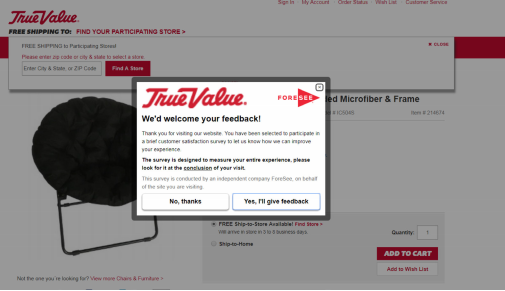
Feedback pop ups can be valuable for getting insights into how your website and company is perceived by it’s customers.
Why it’s a problem
However, doing this mid-shop, at such a crucial moment as when adding products to cart makes no sense, you’re interrupting someone mid shop, presenting them with a distraction that parts them away from a sale.
How to fix it
A better way of doing this might be through sending an email, you can follow up customers of your website with a survey and also potentially entice them to shop again with an offer.
If you want to keep the survey on your website, after a completed purchase,
Remember, you want insightful feedback, presenting this to someone who has never used your website is useless and they won’t be able to say anything meaningful about their experience.
2. Out of stock products that are available to buy???
What happens
Someone is browsing your website and comes across a product they’d like to purchase, it states on the product that is available and ready for delivery.
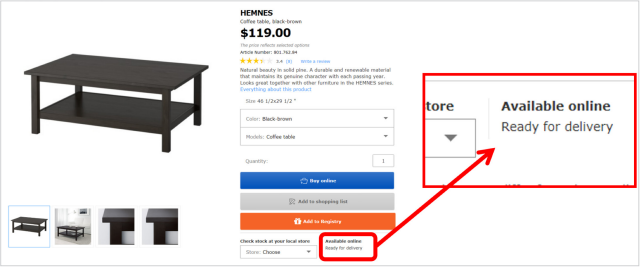
On clicking the ‘Buy’ button, you’re presented with a message to say that the products is currently out of stock.

Why it’s a problem
The obvious is you’ve just disappointed a potential customer, now they either have to find an alternative product or look elsewhere for the same item.
What might not be so obvious is that it gives them a bad perception of your website, you’ve wasted their time looking at a product that wasn’t available, now how are they able to trust the availability notice of anything on your website?
How to fix it
You have three options, if you’re definitely getting stock of the product again, let people know when it will be available again and either let them pre-order the item.
If you’re unsure if you’re getting it or aren’t sure of when it will be available, let them submit an email where they can be notified as to when it is available.
If you are longer going to stock this item, then you should remove it from the website.
3. Showing ads on your own website
What happens
You’re browsing through a website, you see a product you’re interested in so you go to the product page to find some more details.
On this product page there are ads related to the same or similar products on competitor websites.
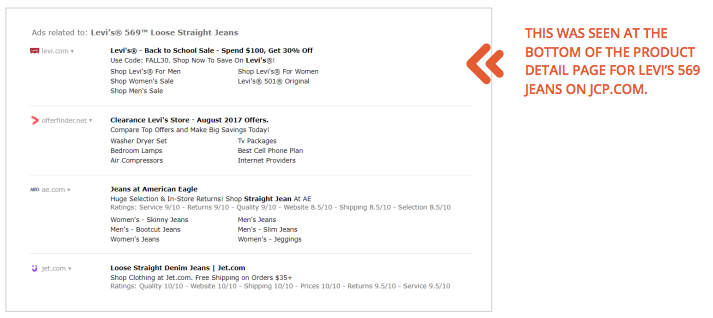
Or you might just have banner ads on your website that have no relation to what you sell.
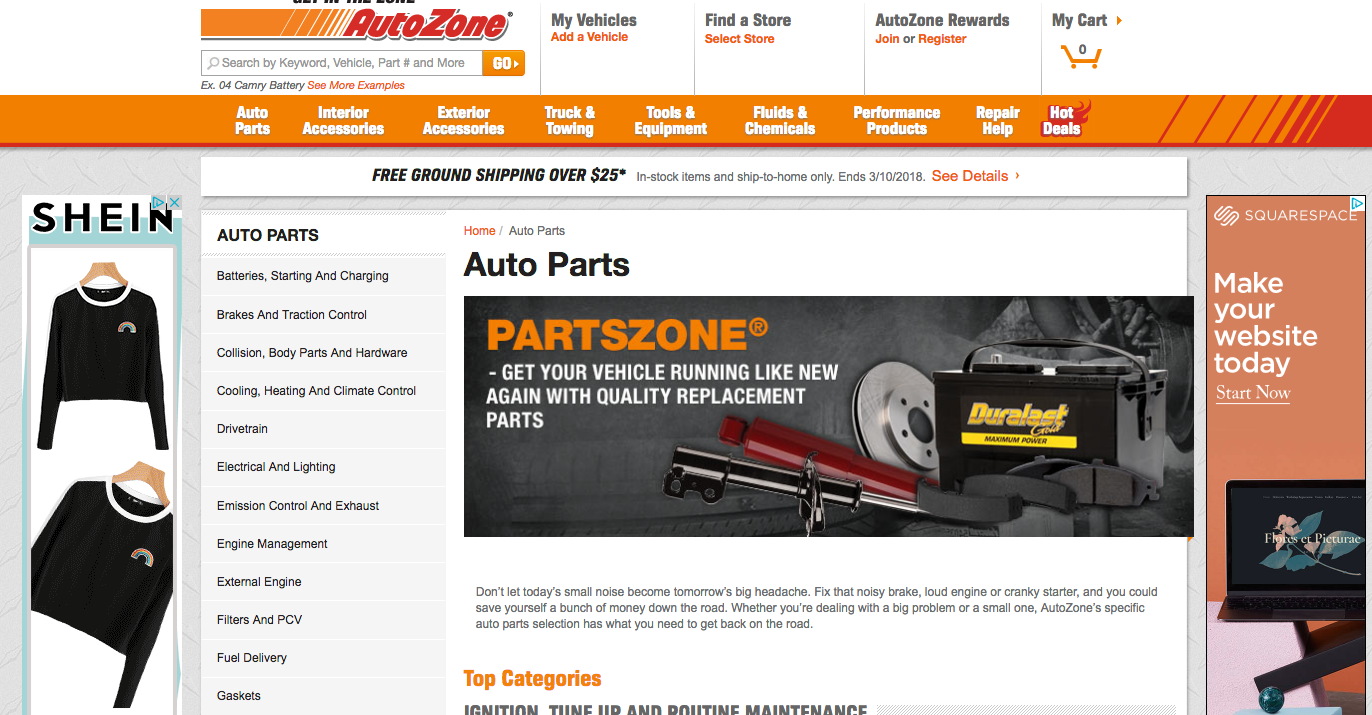
Why it’s a problem
The painstakingly obvious is that you’re potentially losing sales, moreover, you’re setting yourself up to lose these sales to competitors with ads linking to their website.
In most cases, the amount you would get from someone clicking one of these ads will pale in comparison to what you would have made from you selling the item directly.
On top of this, it’s a distraction to the product and cheapens the look of the website and it invites people to go elsewhere, regardless of if the ads are not related to the product they’re looking at.
How to fix it
Don’t have ads on your website, you’re eCommerce website is there to sell products, people have come to your website to see what you have, why would you set it up to lose that to a competitor?
4. Delivery charge to collect from store
What happens
If you have both online and physical brick and mortar stores, it makes sense that you would allow customers to pick up their purchases in store.
What does not make sense however, is that you would charge them for this delivery.

Why it’s a problem
Picking up in store should be a convenience, where the customer essentially ‘does the shipping’ themselves by picking up the item.
Having them pay to have it delivered to your store counteracts this and it then pushes people to get the items delivered.
Not only do you punish the customers for this, but them visiting a store is another chance to sell other items to them.
How to fix it
If you have a store pick up option, do not have a delivery charge, it’s that simple. If for some reason you have to include a charge, make it cost less than a home delivery.
5. Too many choices
What happens
We feel that giving customers the choice will allow for a greater chance of a sale, after all, with more options, comes more choice and more likely to get closer and met your customers requirements.
However there are cases where more options can be bad and counter intuitive, making the choices available seem overwhelming.
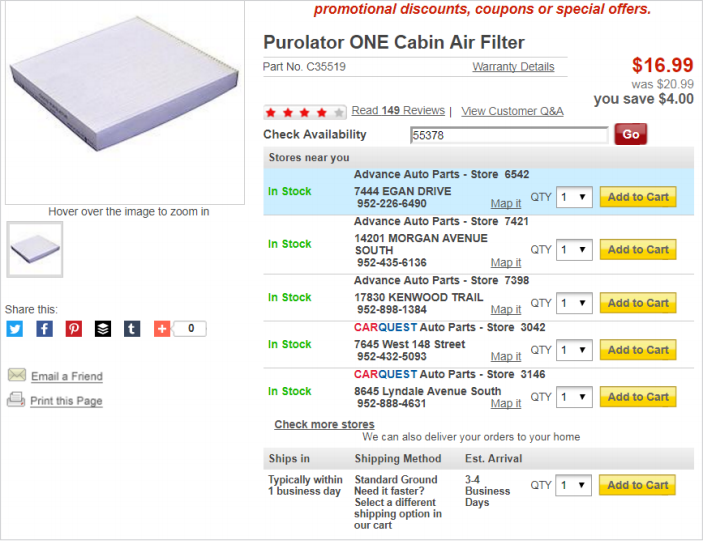
Why it’s a problem
Looking at this page, it makes sense as to what they’re trying to do, show at which locations it’s available, but there is just too much on the page.
How to fix it
In this case, it should be restricted down to two options, either add to basket and have it delivered or pick up in store.
If pick up in store is selected, then have a store look up to show at which ones it’s available, this keeps the page simple and then lets the customer see where they can get it.
6. Unrelated cross sells
What happens
The cross sell, an opportunity to suggest and sell products that are similar or bought alongside what they’re interested in.
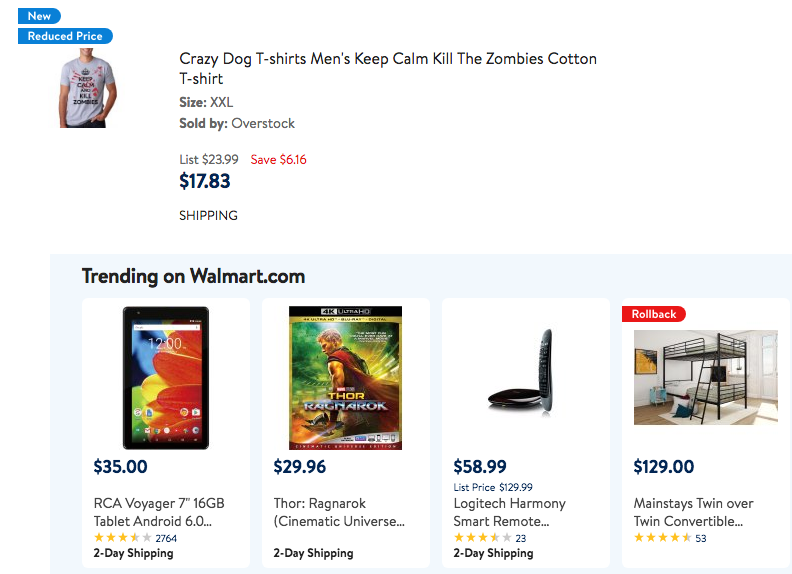
Why it’s a problem
If you show products that are unrelated, you completely miss the ability to sell something that they may be interested in.
How to fix it
There is no quick fix for this, you will need to take the time to put up suitable cross sell products that will match what’s being purchased.
7. Unhelpful alternative suggestions
What happens
When looking at a pair of shoes that comes in multiple colours, if a colour is unavailable your website will display a message saying it’s unavailable and that they’ll need to select another colour.
All makes sense, great.
Now imagine the same situation, but it’s a certain shoe size that’s unavailable, how does suggesting the customer will have to select a different shoe size help?
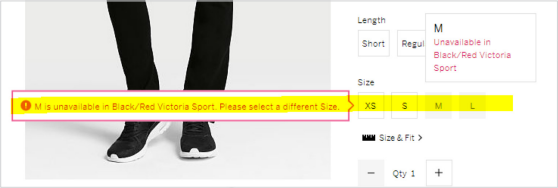
Why it’s a problem
The customer feet will not be able to adjust to a shoe size that’s available, so why make the suggestion to buy a different size, when it’s not going to help them get what they want.
How to fix it
Make sure that if a product or an option on a product is unavailable, that you’re message or suggestions to alternatives make sense.
8. Pop-ups you can’t close
What happens
One thing we;ve noticed on a lot of eCommerce websites is pop ups when you first land on the website.
Pop ups for feedback surveys, joining the mailing list, discount incentives etc. trying to grab your attentions as soon as possible.
Each one of these will normally come with a way to dismiss it like an ‘X’ or ‘no thank you’ button to dismiss it.
There are some however, that seem to have no way of closing it.
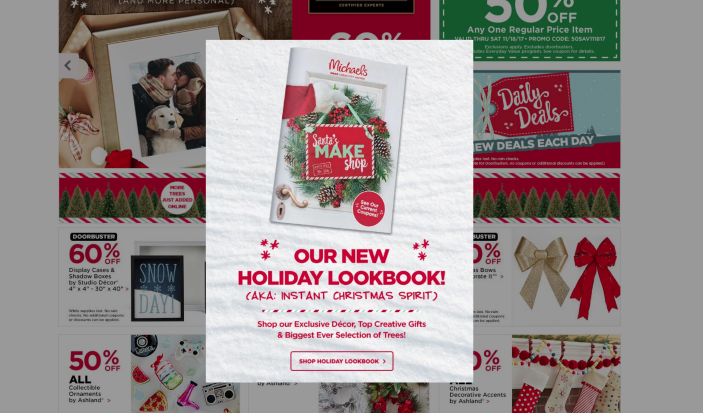
Why it’s a problem
Having a pop up which you can’t close forces a customer down a certain path that they might not want to go or have any interest in.
It might seem like a good idea for you, but it will just irritate those that don’t want to see where the pop up leads or worse, them leave your website.
How to fix it
Very simply if you want to have a pop up show to people arriving on your website, make sure it’s clear how they can dismiss it if it’s not of interest.
Hopefully by the time you see this, the websites will have fixed some of these issues and that the majority of people reading this don’t do this to begin with.
However, it goes to show that even the biggest brands can make mistakes, and if you find that you’ve got something on your website, hopefully this will help in fixing the issue.
If you find you have any issues getting these changes implemented, drop us a message, we’d be happy to help
Continue Reading
Getting Started with AI: A Practical Guide for SMEs
Artificial Intelligence (AI) is transforming how businesses operate — from how we manage data and communicate with customers, to how we plan marketing, sales, and operations. But for many small and medium-sized enterprises (SMEs), AI still feels slightly out of reach. The good news? It’s not. AI is no longer just for tech giants or … Continued

Isev Team
October 14th, 2025
Business Marketing Strategies: Our complete guide
This guide explores essential strategies for Telford businesses looking to expand their reach and improve their marketing performance.

Leanne
September 16th, 2025
What is ecommerce? A Complete Guide for 2025
Ecommerce has completely changed the way we consume and sell. From browsing products on websites and apps to buying directly through social media, selling online makes it easier than ever for businesses to reach customers without the high costs of a traditional store. We’ll explore what e-commerce is, how it works, the different types of … Continued

Isev Team
September 2nd, 2025
PPC in 2025: Why Your Business Should Consider Using Google Ads
Google Ads remains a powerful and constantly evolving solution. It's an great tool for businesses that want to be seen, stay competitive, and achieve tangible growth

Isev Team
August 6th, 2025
https://www.isev.co.uk/wp/wp-includes/js/dist/hooks.min.js
https://www.isev.co.uk/wp/wp-includes/js/dist/i18n.min.js
wp.i18n.setLocaleData( { 'text direction\u0004ltr': [ 'ltr' ] } );
https://www.isev.co.uk/app/plugins/contact-form-7/includes/swv/js/index.js
var wpcf7 = {"api":{"root":"https:\/\/www.isev.co.uk\/wp-json\/","namespace":"contact-form-7\/v1"},"cached":"1"};
https://www.isev.co.uk/app/plugins/contact-form-7/includes/js/index.js
window.ASL = typeof window.ASL !== 'undefined' ? window.ASL : {}; window.ASL.wp_rocket_exception = "DOMContentLoaded"; window.ASL.ajaxurl = "https:\/\/www.isev.co.uk\/wp\/wp-admin\/admin-ajax.php"; window.ASL.backend_ajaxurl = "https:\/\/www.isev.co.uk\/wp\/wp-admin\/admin-ajax.php"; window.ASL.js_scope = "jQuery"; window.ASL.asl_url = "https:\/\/www.isev.co.uk\/app\/plugins\/ajax-search-lite\/"; window.ASL.detect_ajax = 1; window.ASL.media_query = 4766; window.ASL.version = 4766; window.ASL.pageHTML = ""; window.ASL.additional_scripts = [{"handle":"wd-asl-ajaxsearchlite","src":"https:\/\/www.isev.co.uk\/app\/plugins\/ajax-search-lite\/js\/min\/plugin\/optimized\/asl-prereq.js","prereq":[]},{"handle":"wd-asl-ajaxsearchlite-core","src":"https:\/\/www.isev.co.uk\/app\/plugins\/ajax-search-lite\/js\/min\/plugin\/optimized\/asl-core.js","prereq":[]},{"handle":"wd-asl-ajaxsearchlite-vertical","src":"https:\/\/www.isev.co.uk\/app\/plugins\/ajax-search-lite\/js\/min\/plugin\/optimized\/asl-results-vertical.js","prereq":["wd-asl-ajaxsearchlite"]},{"handle":"wd-asl-ajaxsearchlite-load","src":"https:\/\/www.isev.co.uk\/app\/plugins\/ajax-search-lite\/js\/min\/plugin\/optimized\/asl-load.js","prereq":["wd-asl-ajaxsearchlite-vertical"]}]; window.ASL.script_async_load = false; window.ASL.init_only_in_viewport = true; window.ASL.font_url = "https:\/\/www.isev.co.uk\/app\/plugins\/ajax-search-lite\/css\/fonts\/icons2.woff2"; window.ASL.css_async = false; window.ASL.highlight = {"enabled":false,"data":[]}; window.ASL.analytics = {"method":0,"tracking_id":"","string":"?ajax_search={asl_term}","event":{"focus":{"active":1,"action":"focus","category":"ASL","label":"Input focus","value":"1"},"search_start":{"active":0,"action":"search_start","category":"ASL","label":"Phrase: {phrase}","value":"1"},"search_end":{"active":1,"action":"search_end","category":"ASL","label":"{phrase} | {results_count}","value":"1"},"magnifier":{"active":1,"action":"magnifier","category":"ASL","label":"Magnifier clicked","value":"1"},"return":{"active":1,"action":"return","category":"ASL","label":"Return button pressed","value":"1"},"facet_change":{"active":0,"action":"facet_change","category":"ASL","label":"{option_label} | {option_value}","value":"1"},"result_click":{"active":1,"action":"result_click","category":"ASL","label":"{result_title} | {result_url}","value":"1"}}};
https://www.isev.co.uk/app/plugins/ajax-search-lite/js/min/plugin/optimized/asl-prereq.js
https://www.isev.co.uk/app/plugins/ajax-search-lite/js/min/plugin/optimized/asl-core.js
https://www.isev.co.uk/app/plugins/ajax-search-lite/js/min/plugin/optimized/asl-results-vertical.js
https://www.isev.co.uk/app/plugins/ajax-search-lite/js/min/plugin/optimized/asl-load.js
https://www.isev.co.uk/app/plugins/ajax-search-lite/js/min/plugin/optimized/asl-wrapper.js
!function(){"use strict";var e,t,r,n={},o={};function i(e){var t=o[e];if(void 0!==t)return t.exports;var r=o[e]={exports:{}};return n[e](r,r.exports,i),r.exports}i.m=n,e=[],i.O=function(t,r,n,o){if(!r){var u=1/0;for(s=0;s<e.length;s++){r=e[s][0],n=e[s][1],o=e[s][2];for(var a=!0,f=0;f<r.length;f++)(!1&o||u>=o)&&Object.keys(i.O).every((function(e){return i.O[e](r[f])}))?r.splice(f--,1):(a=!1,o<u&&(u=o));if(a){e.splice(s--,1);var c=n();void 0!==c&&(t=c)}}return t}o=o||0;for(var s=e.length;s>0&&e[s-1][2]>o;s--)e[s]=e[s-1];e[s]=[r,n,o]},i.d=function(e,t){for(var r in t)i.o(t,r)&&!i.o(e,r)&&Object.defineProperty(e,r,{enumerable:!0,get:t[r]})},i.f={},i.e=function(e){return Promise.all(Object.keys(i.f).reduce((function(t,r){return i.f[r](e,t),t}),[]))},i.u=function(e){return"js/"+e+"."+{203:"945991",331:"6d9a60",434:"cf540c",514:"1cf7a3"}[e]+".js"},i.miniCssF=function(e){},i.o=function(e,t){return Object.prototype.hasOwnProperty.call(e,t)},t={},r="@roots/bud/sage:",i.l=function(e,n,o,u){if(t[e])t[e].push(n);else{var a,f;if(void 0!==o)for(var c=document.getElementsByTagName("script"),s=0;s<c.length;s++){var l=c[s];if(l.getAttribute("src")==e||l.getAttribute("data-webpack")==r+o){a=l;break}}a||(f=!0,(a=document.createElement("script")).charset="utf-8",a.timeout=120,i.nc&&a.setAttribute("nonce",i.nc),a.setAttribute("data-webpack",r+o),a.src=e),t[e]=[n];var d=function(r,n){a.onerror=a.onload=null,clearTimeout(p);var o=t[e];if(delete t[e],a.parentNode&&a.parentNode.removeChild(a),o&&o.forEach((function(e){return e(n)})),r)return r(n)},p=setTimeout(d.bind(null,void 0,{type:"timeout",target:a}),12e4);a.onerror=d.bind(null,a.onerror),a.onload=d.bind(null,a.onload),f&&document.head.appendChild(a)}},i.r=function(e){"undefined"!=typeof Symbol&&Symbol.toStringTag&&Object.defineProperty(e,Symbol.toStringTag,{value:"Module"}),Object.defineProperty(e,"__esModule",{value:!0})},i.p="/app/themes/isev-theme/public/",function(){var e={666:0};i.f.j=function(t,r){var n=i.o(e,t)?e[t]:void 0;if(0!==n)if(n)r.push(n[2]);else if(666!=t){var o=new Promise((function(r,o){n=e[t]=[r,o]}));r.push(n[2]=o);var u=i.p+i.u(t),a=new Error;i.l(u,(function(r){if(i.o(e,t)&&(0!==(n=e[t])&&(e[t]=void 0),n)){var o=r&&("load"===r.type?"missing":r.type),u=r&&r.target&&r.target.src;a.message="Loading chunk "+t+" failed.\n("+o+": "+u+")",a.name="ChunkLoadError",a.type=o,a.request=u,n[1](a)}}),"chunk-"+t,t)}else e[t]=0},i.O.j=function(t){return 0===e[t]};var t=function(t,r){var n,o,u=r[0],a=r[1],f=r[2],c=0;if(u.some((function(t){return 0!==e[t]}))){for(n in a)i.o(a,n)&&(i.m[n]=a[n]);if(f)var s=f(i)}for(t&&t(r);c<u.length;c++)o=u[c],i.o(e,o)&&e[o]&&e[o][0](),e[o]=0;return i.O(s)},r=self.webpackChunk_roots_bud_sage=self.webpackChunk_roots_bud_sage||[];r.forEach(t.bind(null,0)),r.push=t.bind(null,r.push.bind(r))}()}();
https://www.isev.co.uk/app/themes/isev-theme/public/js/app.b5b5ef.js
https://www.isev.co.uk/wp/wp-includes/js/hoverIntent.min.js
https://www.isev.co.uk/app/plugins/megamenu/js/maxmegamenu.js

![]()













